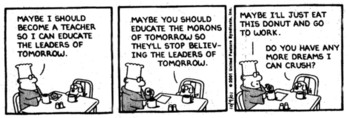 How/why
did it end?
How/why
did it end?The Cold War
What was it? (def. from last time)
"restricted rivalry between the United States and the Soviet Union, waged
on political, economic, and propaganda fronts"
OR: competition between two ideo-economic ways of organizing societies & the globe
When did it begin?
after World War II (narrow definition)
after World War I (broader definition)
How did it deal with problems?
(its "battles")
The Cold War: "Battles"
Comic Interlude 1: Dogbert on education
Review 2: What did we learn?
Review 3: Concepts
Comic Interlude 2: Exams
Facts do matter, but what matters more is what we make of them.
Study tip: Essay 1
Comprehensive essay question:
1. We have discussed many of the ways historical changes have been brought about. Violence has been seen as absolutely necessary—or counterproductive—in causing lasting change. Using at least five examples, with at least one each from the 1700s, 1800s, and 1900s, and coming from at least four regions of the globe, argue why you think violence should or should not be used to effect change. In each case, be sure to explain what role the historical and cultural context plays in your assessment. Note that you should consider the long-term outcome of the use of violence: Were the ultimate results what the protagonists wanted?
Study tip: Essay 2
Post-midterm essay question:
2. Some historians have argued that "great men make history." Others argue that history is really the story of common people, including especially women, since their status is often a more accurate measure of the nature of a society. Using at least five examples from at least four regions of the globe since the 1880s, argue why (or why not) the history of women and gender relations is relevant to the course of world history. Feel free to consider broader issues such as what our textbook calls the "population bomb."
Lecture on 6/5/03 by H. Marcuse, prepared for web on 6/9/03
back to top, UCSB Hist 2c/2003
homepage